Alan Bradley
Books: Mystery | Historical
Flavia de Luce: The Sweetness at the Bottom of the Pie (2009), The Weed That Strings the Hangman's Bag (2010), A Red Herring Without Mustard (2011), I Am Half-Sick of Shadows (2011), Speaking from Among the Bones (2013), The Dead in Their Vaulted Arches (2014)
Flavia de Luce
The Sweetness at the Bottom of the Pie (2009)
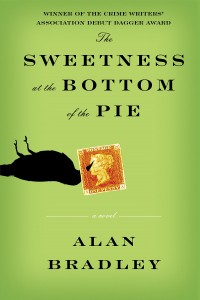 As usual, I didn't re-read the blurb before diving in, so I had no idea what was was starting, besides a mystery. The title made me think of the South, and cotton plantations, and pecan pie.
As usual, I didn't re-read the blurb before diving in, so I had no idea what was was starting, besides a mystery. The title made me think of the South, and cotton plantations, and pecan pie.
I was very very wrong in this.
It is the summer of 1950 and Flavia de Luce is 11 years old. But she's not quite your typical 11 year old–she lives in Bishop's Lacey in England and loves chemistry. And when there is a murder, she's quite intrigued.
I wish I could say I was afraid, but I wasn't. Quite the contrary. This was by far the most interesting thing that had ever happened to me in my entire life.
Of course, she has to keep her older sisters from tying her up and locking her in a closet again, if she wants to discover the murderer.
Of course, she has resources many police detectives don't.
I was nabbed. There was nothing else to d but burst into tears. I hated to do it, but it was the only tool I had with me.
But then she is only eleven.
I remembered a piece of sisterly advice, which Feely once gave Daffy and me:
"If you're ever accosted by a man," she'd said, "kick him in the Cassanovas and run like blue blazes!"
Although it had sounded at the time like a useful bit of intelligence, the only problem was that I didn't know where the Cassanovas were located.
This was an unusual story, and one I quite enjoyed. It was different, and I can see that in real life Flavia might be unbearably irritating, but to read about, she was a delight. I loved the references to chemistry, and the time setting was a fascinating one, in that so many of the things that happened would have been highly unlikely 25 years earlier or later, from Flavia wandering about on her own, to the forensic techniques that had yet to be developed.
If you enjoy British mysteries, I can recommend The Sweetness at the Bottom of the Pie–even if it's not set in the Southern US, and pecan pie makes no appearance.
Published by Delacorte Press
November 2013 | Rating: 8/10
The Weed That Strings the Hangman's Bag (2010)
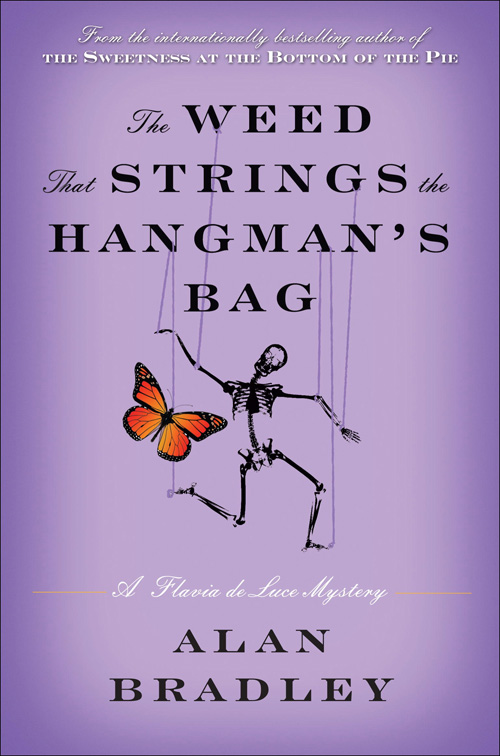 This is the second Flavia de Luce book.
This is the second Flavia de Luce book.
Flavia is eleven and fascinated by chemistry and poisons. And murder, although that was a recent discovery.
She has two older sisters who dislike and torment her, and a father who is wrapped up in his stamps, and so Flavia runs wild, wandering the village on Gladys, her bicycle, and doing chemical experiments that would horrify any modern parent.
…(my old friend chloral hydrate, I noted: C2H3Cl32O2–a powerful hypnotic that when slipped into alcohol to American thugs was called a "Mickey Finn." In England, it was slipped to high-strung housewives by country doctors and called "something to help you sleep.").
Flavia is both old and young for her age, which leads to many (from an adult's perspective) hilarious events and insights.
"I'll be ready in a jiff," I said, walking towards the W.C. No one, anywhere, at any time in history, has ever stopped a female en route to the Baffins.
When one lives in a village, the more things are hushed up, the more one hears.
That is so very like Agatha Christie's Miss Marple, which, I hadn't previously realized, many of whose books were set and written during the same time frame as this series.
Perhaps that's why I enjoy this series so much, because it's a familiar time, from all my immersion in St Mary Mead.
This is another lovely story, and I'm looking forward to the next.
Published by Dell
March 2014 | Rating: 8/10
A Red Herring Without Mustard (2011)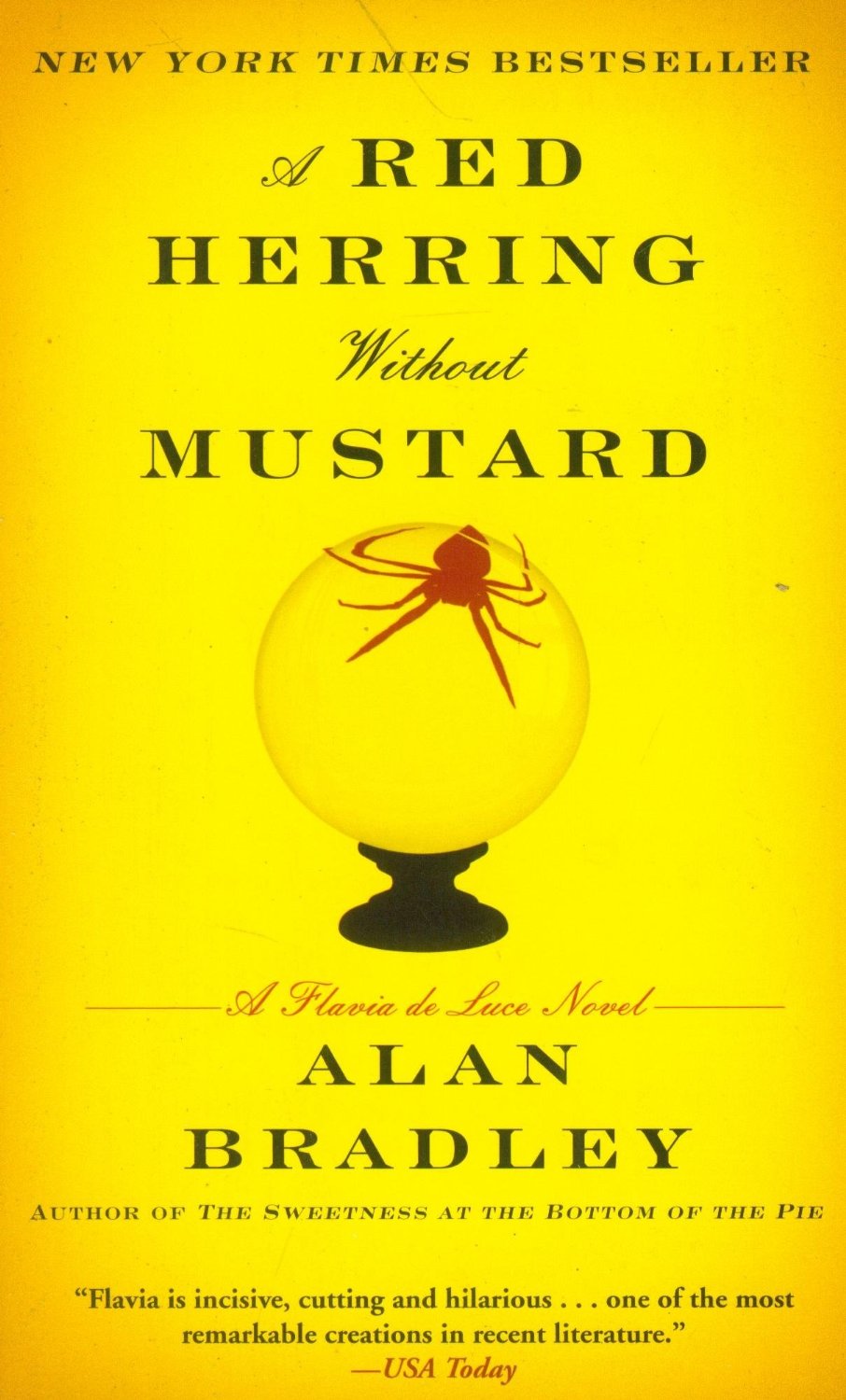
This is the third Flavia de Luce book, and the de Luce family still hovers on the edge of ruin. I'll actually be curious to see how long into the series this particular sword hangs over their heads.
But that is not the start–or even the main part–of the story. The story begins with a fortune teller, looking a Flavia's fortune, and seeing perhaps also he past. Her pronouncements freak out Flavia who then, accidentally burns down the woman's tent. Looking to make amends, Flavia tries to do what she can, only to discover that this old woman was familiar with her mother–Harriet who disappeared when Flavia was a year old.
There end up being multiple crimes, and it was the old crime that seemed so out of place to me. Well, not the crime itself (that seemed somewhat obvious to this veteran reader of mysteries) but instead why Flavia became interested in Hobblers. (I think the Hobblers were not a real religion, but were based on the Dunkers. But I did only a cursory search of both the Internet and my memory.) I mean, the Hobblers were interesting to me, but I remain fascinated by comparative theology. It doesn't really seem like Flavia's thing, and I don't quite see what turned her onto them.
This wasn't a game breaker, it was just a bit off.
Through this story, Flavia remains obsessed with chemistry, her father with stamps, and her two sisters continue to torment her, although we see glimpses that they–despite everything Flavia does–still love her.
I slipped stealthily into the picture gallery, which occupied nearly the entire ground floor of the east wing.
An army of de Luce ancestors gazed down upon me as I passed, in whose faces I recognized , uncomfortably, aspects of my own. I wouldn't have liked most of them, I thought, and most of them wouldn't have liked me.
I did a cartwheel just to show them that I didn't care.
There were also views of Post WWII England that seemed likely, even if they weren't necessarily real.
The third film, The Maintenance of Aero Engines: Part III, must have been something left over from the war— a film that was being shown simply because it happened to be in the same box as the others.
That seems so very much like something that would happen, it just tickled my fancy. As did Flavia's thoughts on prayer.
Thinking and prayer are much the same thing anyway, when you stop to think about it— if that makes any sense. Prayer goes up and thought comes down— or so it seems. As far as I can tell, that's the only difference.
Although I still don't see why Flavia became interested in the Hobblers, it was still an interesting story, and enjoyable.
Published by Delacorte Press
April 2014 | Rating: 7/10
I Am Half-Sick of Shadows (2011)
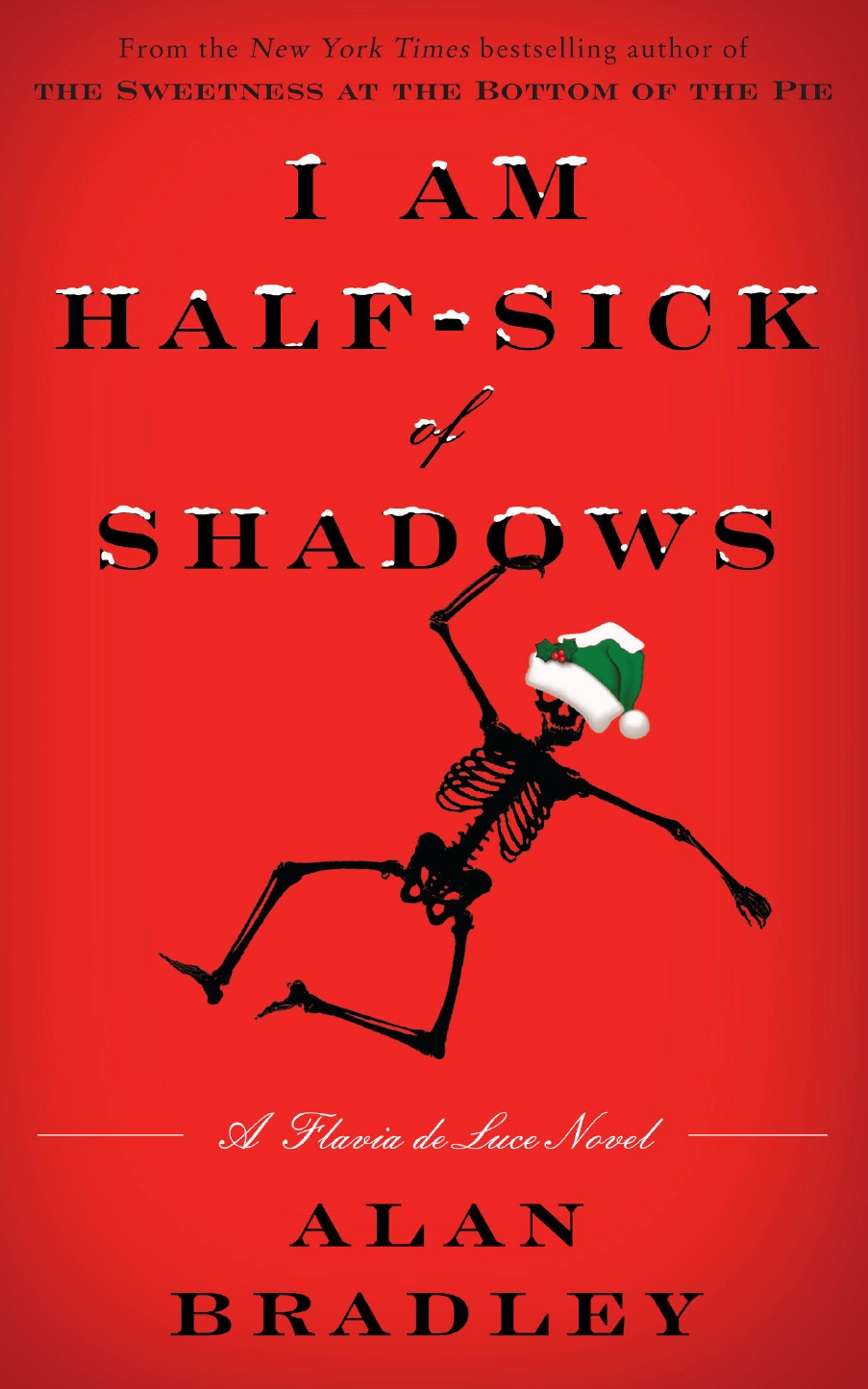 It's almost Christmas, and Flavia has grave suspicious about St. Nick. How he really come down the chimney to leave gifts? And if he does, can he be caught?
It's almost Christmas, and Flavia has grave suspicious about St. Nick. How he really come down the chimney to leave gifts? And if he does, can he be caught?
Unfortunately, the de Luce household is in an even greater uproar than normal, since Father is allowing a movie crew to film at their house, as a way of, perhaps, keeping the family afloat a little longer.
I fully admit that as soon as I read about Flavia's plan to try and trap St Nick, I knew the murderer was going to spring the trap. But I didn't know HOW that was going to occur, and I wasn't at all disappointed when it did happen.
Because this is, of course, a Flavia book, and you already know things she doesn't, but you're glad to be along.
Although it is pleasant to think about poison at any season, there is something special about Christmas…
Of course it is.
I had concocted the gunpowder myself from niter, sulfur, charcoal, and a happy heart. When working with explosives, I've found that attitude is everything.
But don't think she gets away with it all.
"Impertinent children ought to be given six coats of shellac and set up in public places as a warning to others." Aunt Felicity sniffed.
The story may be improbable, but Flavia is marvelous.
Published by Delacorte Press
August 2014 | Rating: 7/10
Speaking from Among the Bones (2013)
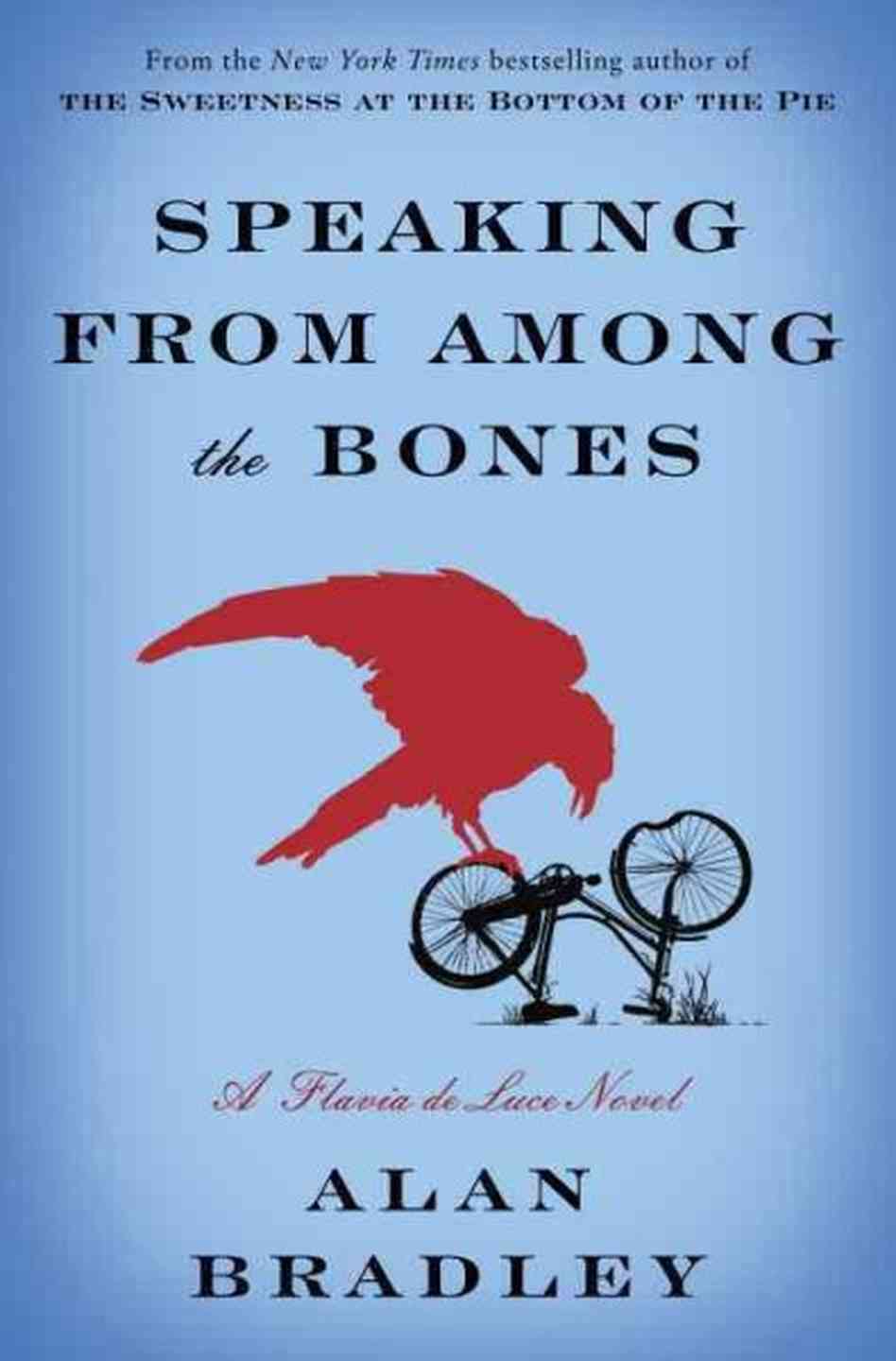 The wolves are no longer at the door. Her father can no longer keep up with the creditors, and they're out of money.
The wolves are no longer at the door. Her father can no longer keep up with the creditors, and they're out of money.
Meanwhile, the vicar is excavating the bones of Saint Tancred, on the 500th anniversary of his martyrdom. But as much as some people want the bones excavated, others–including the bishop–do not. Which means everyone in the village is in turmoil.
As always, the book is full of delightful tidbits that Flavia as picked up and dispenses as she pleases.
Once out of sight, I trudged upward, recalling that ancient stairs in castles and churches wind in a clockwise direction as you ascend, so that an attacker, climbing the stairs, is forced to hold his sword in his left hand, while the defender, fighting downward, is able to use his right, and usually superior, hand.
You could feel the thaw. In an instant, the temperature in the church went up by at least 10 degrees Celsius (or 283 degrees Kelvin).
But mostly, Flavia is Flavia.
I flipped on the switch marked "Shuddering Sobs," but nothing came. Damnation! I used to be a dab hand at water on demand. What on earth was happening to me? Was I becoming hardened? Was this what being twelve was going to be like?
This was no ordinary household skeleton key, but one of the patent Yale variety. Whoever had this lock installed had meant to keep people out. Odd, though, that they should leave the key so handily under a broken flowerpot.
That is, of course, something I've never understood myself.
The book ended on a bit of a cliff-hanger, which I never love, but you'll have that, I suppose.
Published by Delacorte Press
September 2014 | Rating: 7/10
The Dead in Their Vaulted Arches (2014)
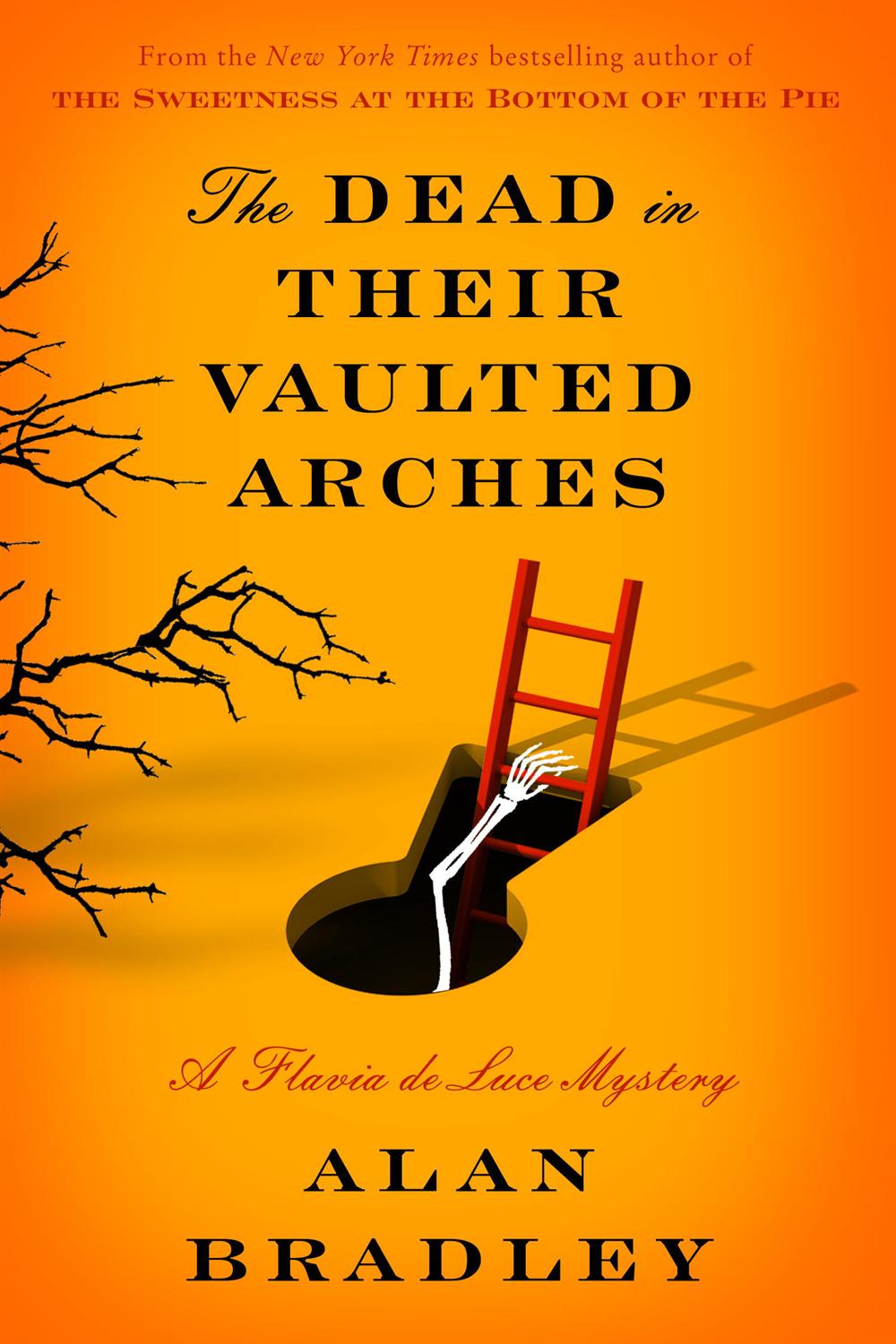 The previous book ended with the news that Harriet de Luce had been found. This book opens with Harriet's body returning to Buckshaw, in all pomp and circumstance–none of which does Flavia and her sisters and father much good, since their home is still up for sale (although the signs have been taken down in respect for the funeral).
The previous book ended with the news that Harriet de Luce had been found. This book opens with Harriet's body returning to Buckshaw, in all pomp and circumstance–none of which does Flavia and her sisters and father much good, since their home is still up for sale (although the signs have been taken down in respect for the funeral).
I am finding, for instance, that I'm having a great deal of trouble forgiving Harriet for being dead…. It makes no sense, I know, but there it is. The best I can do is to allow myself to hate her for a while. Well, perhaps not hate, precisely, but to be highly cheesed off with her…
I didn't much care for this book. Most of the story was of Harriet's return, and the secrets the de Luce family has kept, although there was a murder at the edges of the tale, it was mostly Flavia's reactions to the return of her Mother's body, and the secrets winding and raveling around the family. That wasn't a bad thing per se, but I had some trouble with Flavia's reactions to many things. She is often over the top, but some of her plans in this story are… they just seemed ridiculous, even for Flavia, who does some pretty ridiculous (although sound according to her logic).
Flavia is still Flavia.
One of the marks of a truly great mind, I had discovered, is the ability to feign stupidity on demand.
But as I said, things just seemed a tad bit far-fetched at times.
If you're following the series, there is no way to miss this story, because so much happens here. But it feels as if there was both too much and not enough to the story.
Published by Delacorte Press
September 2014 |
